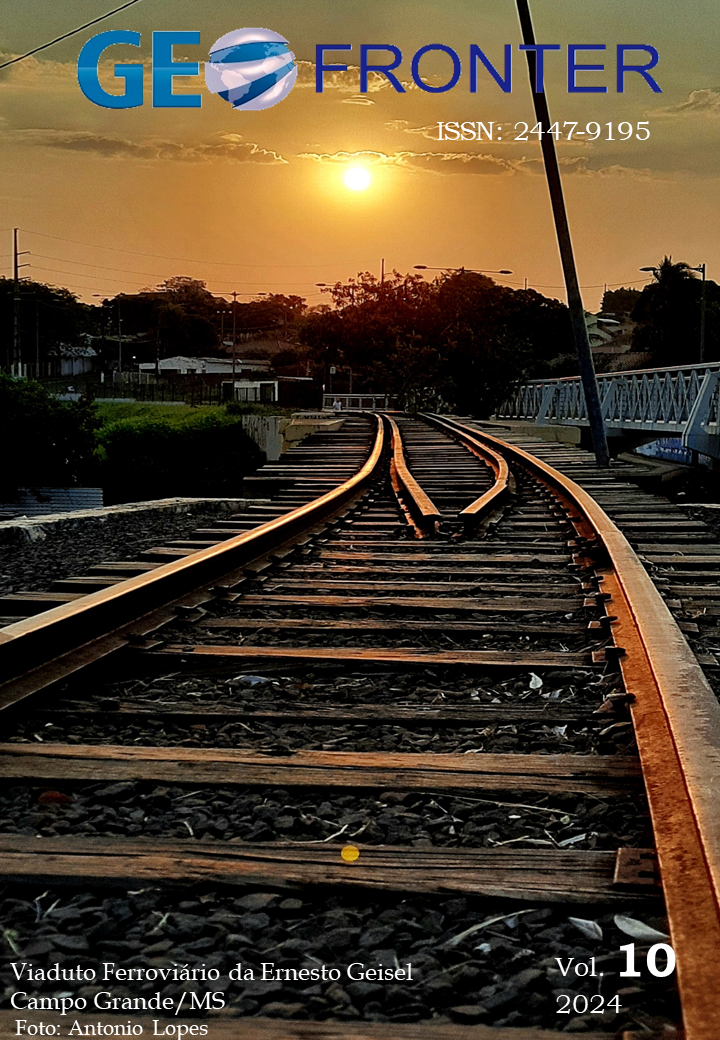PERCEPÇÃO AMBIENTAL DOS PROFESSORES DOS ANOS INICIAIS EM UMA ESCOLA MUNICIPAL NA CIDADE DE CAMPO GRANDE - MS
DOI:
https://doi.org/10.61389/geofronter.v10.7746Palavras-chave:
Meio ambiente, Percepção ambiental, Mapas mentaisResumo
Esse artigo tem como objetivo refletir sobre a relevância da construção de um pensamento crítico sobre a educação ambiental nos anos iniciais do Ensino Fundamental a partir da percepção dos professores de uma escola pública municipal localizada na cidade de Campo Grande – MS sobre meio ambiente. A abordagem da Educação Ambiental Crítica possibilita associar questões socioeconômicas e ambientais discutindo aspectos que afetam as relações estabelecidas entre o ser humano e o seu meio. Elaboramos um estudo bibliográfico e o aporte teórico metodológico baseou-se na perspectiva de meio ambiente de autores como Leff (2009, 2012), Reigota (2007) e Freire (1979). Realizou-se ainda a apreciação de desenhos – mapas mentais, representando o meio ambiente elaborados por educadores. A análise dessas representações mentais é apoiada na metodologia Kozel (2007/2010), que observa os símbolos utilizados pelos desenhistas e favorece a interpretação da percepção dos aspectos relacionados ao meio ambiente. Através das análises dos desenhos podemos apontar a preocupação que os educadores demonstraram com o meio ambiente, para sua conservação e preservação visando a manutenção da vida no planeta. Aponta-se ainda as relações que são estabelecidas entre o homem e a natureza da qual depende a continuidade da vida, podemos inferir que os participantes valorizam a presença de elementos naturais e humanos no ambiente.
Referências
BRASIL. Ministério da Educação. CNE/CP Resolução nº 2 - Base Nacional Comum Curricular. Secretaria de Educação Básica. Brasília: MEC/ SEF, 22 de dezembro de 2017.
BRASIL. Secretaria de Educação Fundamental. Parâmetros Curriculares Nacionais: História, geografia/ Secretaria de Educação Fundamental. – Brasília: MEC/SEF, 1998.
FREIRE, Paulo. Conscientização: teoria e prática da libertação: uma introdução ao pensamento de Paulo Freire / Paulo Freire; [tradução de Kátia de Mello e Silva; revisão técnica de Benedito Eliseu Leite Cintra]. – São Paulo: Cortez & Moraes, 1979.
KOZEL, Salete. Mapas mentais – uma forma de linguagem: Perspectivas metodológicas in: KOZEL S. et al (org.): Da percepção e cognição à representação. São Paulo. Terceira Margem, 2007. p.114-138
KOZEL, Salete. Representação do espaço sob a ótica dos conceitos: mundo vivido e dialogismo. In: Encontro Nacional dos Geógrafo, 16, Porto Alegre - RS 2010. Anais... Porto Alegre – RS: UFRGS, 2010.
LEFF, Enrique. Aventuras da epistemologia ambiental: da articulação das ciências ao diálogo de saberes. São Paulo: Cortez, 2012.
LEFF, Enrique. Complexidade, Racionalidade Ambiental e Diálogo de Saberes. Revista Educação & Realidade. v. 34, n.3, p. 17/24 set./dez. 2009. Porto Alegre. Disponível em: https://seer.ufrgs.br/educacaoerealidade/article/view/9515. Acesso em 10 jun. 2021.
MORIN, Edgar. Ciência com consciência. 6ª ed. Trad. Maria D. Alexandre e Maria Alice S. Dória. RJ: Bertrand Brasil, 2002.
REIGOTA, M. Meio Ambiente e Representação Social. 4. ed. São Paulo: Ed. Cortez, 2007.
Downloads
Publicado
Como Citar
Edição
Seção
Licença

Este trabalho está licenciado sob uma licença Creative Commons Attribution-NonCommercial-NoDerivatives 4.0 International License.
Os autores concedem à revista GEFRONTER os direitos autorais sobre o texto aceito para publicação. Autorizações especiais podem ser concedidas mediante aceite do editor do periódico.

